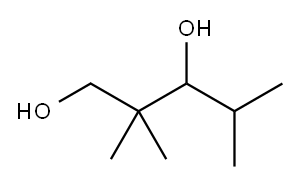|
|
| | 2,2,4-Trimethyl-1,3-pentanediol Basic information |
| Product Name: | 2,2,4-Trimethyl-1,3-pentanediol | | Synonyms: | 2,2,4-Trimethylpentandiol;1,3-PENTANEDIOL,2,2,4-TRIME;2,2,4-TRIMETHYLPENTANE-1,3-DIOL 96%;2,2,4-TriMethyl-1,3-pentanediol (TMPD);2,2,4-Trimethylpentane-1,3-diol,96%;2,2,4-Trimethylpentane-1,3-diol,98%;2,2,4-TriMethyl-1,3-pentandiol;2,2,4-Trimethyl-1,3-pentanediol 97% | | CAS: | 144-19-4 | | MF: | C8H18O2 | | MW: | 146.23 | | EINECS: | 205-619-1 | | Product Categories: | Fine Chemical;Polymer Science;Monomers;Alcohols | | Mol File: | 144-19-4.mol |  |
| | 2,2,4-Trimethyl-1,3-pentanediol Chemical Properties |
| Melting point | 50-53 °C (lit.) | | Boiling point | 232 °C (lit.) | | density | 0,937 g/cm3 | | vapor pressure | 0.314Pa at 20℃ | | refractive index | 1.4513 | | Fp | >230 °F | | storage temp. | Sealed in dry,Room Temperature | | solubility | Chloroform, Methanol | | form | Solid | | pka | 14.81±0.20(Predicted) | | color | Off-White | | Water Solubility | 31.5g/L at 20℃ | | BRN | 1698098 | | InChIKey | JCTXKRPTIMZBJT-UHFFFAOYSA-N | | LogP | 1.25 at 22℃ | | CAS DataBase Reference | 144-19-4(CAS DataBase Reference) | | NIST Chemistry Reference | 1,3-Pentanediol, 2,2,4-trimethyl-(144-19-4) | | EPA Substance Registry System | 2,2,4-Trimethyl-1,3-pentanediol (144-19-4) |
| Hazard Codes | Xi | | Risk Statements | 36/37/38 | | Safety Statements | 26-37/39 | | WGK Germany | 1 | | RTECS | SA1400000 | | TSCA | Yes | | HS Code | 2905.39.9000 | | Hazardous Substances Data | 144-19-4(Hazardous Substances Data) | | Toxicity | guinea pig,LD50,oral,2gm/kg (2000mg/kg),Toxicology and Applied Pharmacology. Vol. 29, Pg. 87, 1974. |
| | 2,2,4-Trimethyl-1,3-pentanediol Usage And Synthesis |
| Chemical Properties | (96% pure): White solid. Slightly soluble in water; soluble in alcohol,
acetone, ether, and benzene. Combustible. | | Chemical Properties | 2,2,4-Trimethyl-1,3-pentanediol is a somewhat volatile liquid. | | Uses | Main uses of 2,2,4-Trimethyl-1,3-pentanediol are as a
component of polyester resins used in food packaging and as an insect repellent. Industrial exposure is likely to be by
direct contact with the liquid. Vapors or mists may be
encountered under some conditions. | | Uses | Polyester resins, plasticizers, lubricants, surface
coatings and printing inks, insect repellent. | | Uses | 2,2,4-Trimethyl-1,3-pentanediol is used in the synthesis of monoisobutyrate derivatives used in film forming auxilleries in paint substances. | | Production Methods | 2,2,4-Trimethyl-1,3-pentanediol is made by reacting isobutyryl
chloride with ethyl isobutyrate. | | Definition | 2,2,4-Trimethyl-1,3-pentanediol (TMPD) glycol, with one primary and one secondary hydroxyl function, shows the typical reactivity of a diol. In comparison to other diols, such as 1,4-cyclohexanedimethanol) or NPG (Neopentyl glycol), TMPD glycol has an unsymmetrical structure and shielded hydroxyl groups.
| | Flammability and Explosibility | Non flammable | | Toxicology | 2,2,4-trimethyl-1,3-pentanediol (TMPD Glycol) is classified as "slightly toxic". In rabbits, moderate eye irritation was observed. Slight to no skin irritation occurred in guinea pigs, and no skin sensitization was found. Repeated skin application studies in humans gave no evidence of irritation, sensitization, photosensitization, or systemic toxic effects. In humans, TMPD glycol is rapidly excreted in the urine, partly unchanged, partly as the glucuronide and sulfate conjugates, and partly as 2,2,4-trimethyl-3-hydroxyvaleric acid. LD50 2000 (rat, oral), LD50 145 (rat, intravenous).
|
| | 2,2,4-Trimethyl-1,3-pentanediol Preparation Products And Raw materials |
| Raw materials | 3-Hydroxy-2,2,4-trimethylvaleraldehyde-->2,6-Diisopropyl-5,5-dimethyl-1,3-dioxan-4-ol-->3-Pentanone, 1-hydroxy-2,2,4-trimethyl--->3-hydroxy-2,2,4,4-tetramethylcyclobutan-1-one-->2,4-Dimethyl-3-pentanol-->3-hydroxy-2,2,4-trimethylpentyl isobutyrate-->TETRAMETHYL-1,3-CYCLOBUTANEDIONE-->Isobutyryl chloride | | Preparation Products | 2.2.4-TRIMETHYL-1-PENTANOL |
|